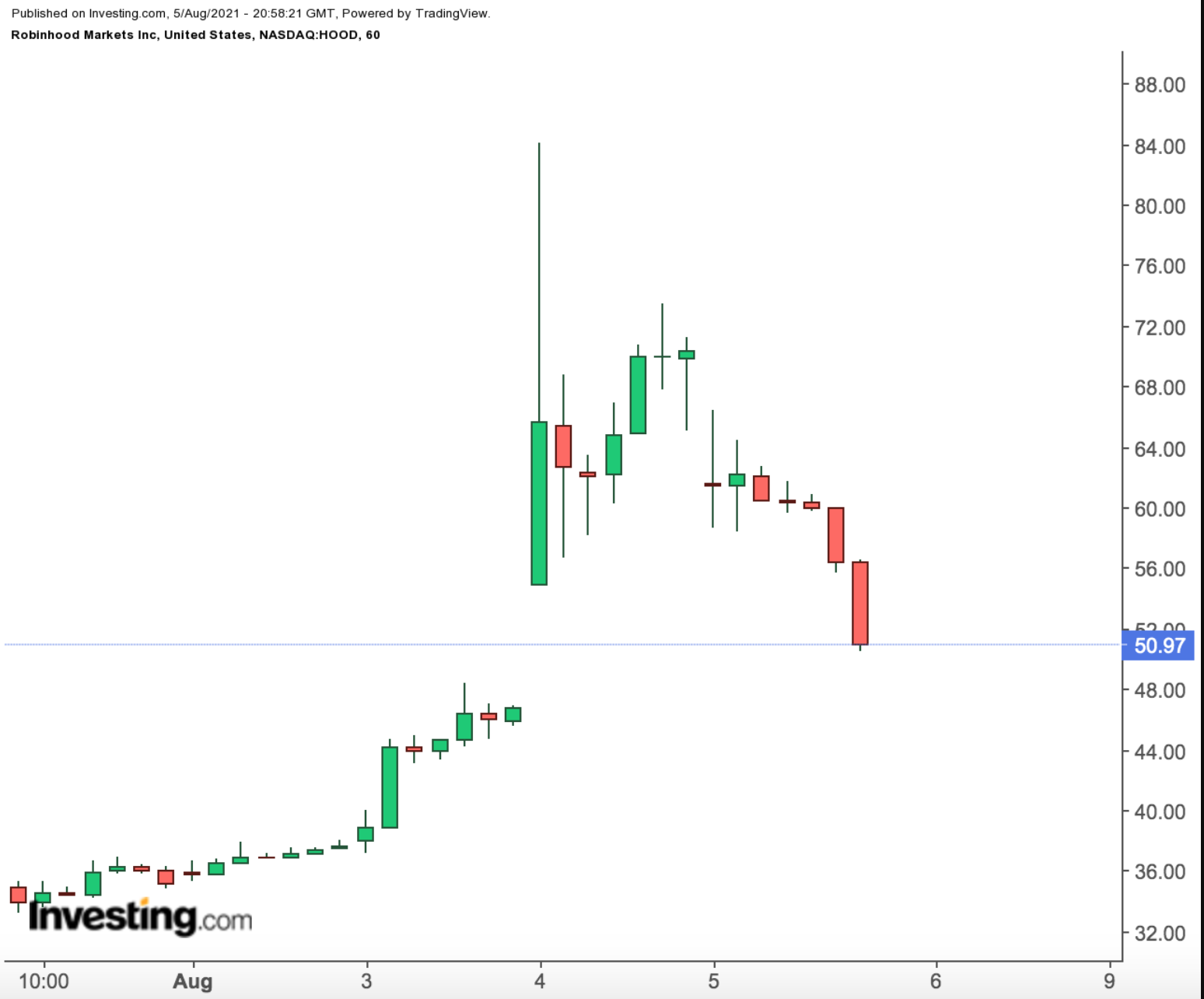Robinhood (NASDAQ:HOOD) has revolutionized trading in markets with its easy-to-use, no-fee based platform. Shares in the zero-fee trading platform are on a familiar trajectory. Just like recent rallies in meme stocks, it has become the centre of attention for retail investors.
Robinhood stock jumped 50% on Wednesday after an army of individual investors joined the likes of Cathie Wood, who bought shares in the trading platform after its IPO last week. The frenzied share-buying pushed the company’s market value to a peak of $65 billion from $29.1 billion after its debut on NASDAQ on July 28. Yesterday, Robinhood closed at $50.97, down almost 19.5% on the day.

The California-based company attracted retail investors after giving roughly 25% of its IPO shares to its own clients. HOOD was a “top traded stock” on Fidelity, which is generally a good proxy for individual investor interest on a given day.
The moves of this magnitude put Robinhood in the group of highly volatile meme stocks, like GameStop (NYSE:GME) and AMC Entertainment (NYSE:AMC). But the question for long-term investors is quite simple: is it the right time to buy Robinhood?
According to Atlantic Equities, which has a $65-a-share price target on the stock, Robinhood is on a solid growth path that makes its stock attractive for growth investors.
In a note last week, the brokerage said:
“We believe this superior user growth will continue given the success of the referral program and the product appeal among its target demographic.”
In addition to its user-growth potential, Robinhood also has upside in how much revenue it generates per user, Atlantic said, adding:
“Although Robinhood has delivered a three-year revenue [compound annual growth rate] of 169%, we see potential for the firm to build out its product portfolio further.”
ARK Invest chief Cathie Wood, who is popular on internet forums like Reddit’s WallStreetBets, bought more than 89,600 shares of Robinhood on Tuesday for her ARK Fintech Innovation ETF (NYSE:ARKF). That purchase adds to Wood’s prior purchases of 3.15 million of Robinhood shares since last week’s IPO.
On A Collision Course
Despite this enthusiasm, there are some clear risks to Robinhood’s revenue model that long-term investors should keep in mind if investing in this name.
Robinhood is on a collision course with regulators over a controversial practice that generates most of its revenue. Robinhood disclosed that 81% of its first-quarter revenue came from sending its customers’ orders on stocks, options and cryptocurrencies to high-speed trading firms—a practice known as payment for order flow.
Securities and Exchange Commission Chairman Gary Gensler said in June that the SEC was reviewing payment for order flow, fueling speculation that the practice could be banned.
In a CNBC interview in June, Gensler questioned the brokerage industry’s argument that payment-for-order-flow arrangements have allowed retail investors to trade stocks for free.
“I think that’s a misperception. It’s not free trading,” Gensler said. “It is zero commission, but not necessarily free,” he added, noting that the data brokerages’ gain is valuable.
These uncertainties and a large holding by retail investors are perhaps behind the large sell orders by Robinhood’s early investors. In a filing disclosed Thursday, the company revealed that more than a dozen of its existing shareholders filed to sell up to 97.9 million shares in a post-IPO share offering. These investors include many of the company's biggest venture backers—including New Enterprise Associates, Ribbit Capital, Thrive Capital and Andreessen Horowitz.
Bottom Line
Robinhood is a new addition to the group of meme stocks that we don’t recommend to long-term investors due to their detachment from fundamentals. That said, Robinhood has a solid business that could see further growth if the SEC review doesn’t hurt its existing business model. As long as that uncertainty lingers, it’s better to stay on the sidelines.
